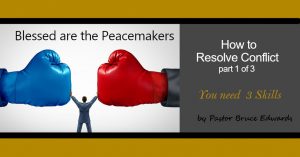resolving conflict – 4 biblical steps to defuse an argument
The World is Broken
 Resolving conflict is one of the most important skills you can learn. Nobody likes conflict, but it is a part of life. It is unavoidable because we live in a broken world. The earth is groaning, waiting for its day of redemption. (Romans 8:22) One day Jesus will return to restore all of the world and end all conflict, but until then we need to learn how to resolve conflict.
Resolving conflict is one of the most important skills you can learn. Nobody likes conflict, but it is a part of life. It is unavoidable because we live in a broken world. The earth is groaning, waiting for its day of redemption. (Romans 8:22) One day Jesus will return to restore all of the world and end all conflict, but until then we need to learn how to resolve conflict.
Conflict Never Resolves Itself
Conflict never resolves itself, but very few know how to resolve conflict. The problem is, we’ve not been taught by our parents how to resolve conflict, there are no courses in high school that teach students how to deal with conflict, and it’s not something that comes naturally. So, most people deal with conflict by ignoring it, denying it, pretending there is no conflict, or they try to sweep it under the rug. Resolving conflict is important.
3 Ways Unresolved Conflict Damages You
The conflict has to be dealt with. A conflict that is left unresolved will damage your life three ways:
- It blocks your fellowship with God
- It hinders your prayers
- It steals your joy
A conflict that goes unresolved for any length of time turns into bitterness and anger. Not only does conflict cause great damage individually it creates an unhealthy environment within organizations, marriages, businesses, communities, and even the church.
Our Culture is Filled with Conflict
Our world is filled with conflict. It’s all around us. We see it on the front page of the newspapers and on the nightly news. Social media is filled with images and sound bites of all kinds of confrontation; politically, racially, internationally, culturally, and in families. Talk radio fuels and escalates conflict to a heated pitch.
What is the Answer? Be a Peacemaker!
So, what is the answer? How do you effectively resolve conflict? The answer is – become a PEACEMAKER! A peacemaker is someone who actively overcomes evil with good. Peacemakers use their influence to help bring reconciliation and peace. Peacemakers know that true peace is only found in Christ. Ultimately peacemakers are concerned that all men be at peace with God.
Blessed are the Peacemakers
In Matthew 5:9 Jesus said, “Blessed are the peacemakers, for they will be called children of God.” The world is in desperate need of Godly peacemakers. However, – there are just not very many who serve as peacemakers. Instead, our culture seems to champion rabble-rousers. We tend to admire those who will confront and even stir up hostility and hate in the name of so-called justice. People become easily offended. We even take on the offenses of others. There are way more people trying to stir up strife and conflict than there are those who are trying to bring peace. There is a great need for people to become peacemakers.
Be a Peacemaker
I want to teach you how to be a peacemaker. God is calling you to be a peacemaker within your personal relationships, your spouse, children, other family members, friends, classmates, and coworkers. God also wants to use you as an agent of peace in the areas where you have influence. It may be in the workplace or in a civic group, or a small group at church, or in your community. There are some who are reading this, and you are in a position of great authority and you have the opportunity to be a peacemaker on a large scale.
It Depends on You
Romans 12:17-18 says, “Do not repay anyone evil for evil. Be careful to do what is right in the eyes of everyone. If it is possible, as far as it depends on you, live at peace with everyone. Notice it says IF it is possible whatever you can do – “do it” – for the sake of peace. Notice – IT DEPENDS ON YOU! But, only if it’s possible. There are some situations that are NOT possible. The parties involved are not interested in peace. They rather fight. They are contentious and they do everything they can to create conflict.
3 Skills Required to be a Peacemaker
Notice Jesus did not say blessed are the peacekeepers but the peacemakers! The difference is a peacemaker actively becomes involved in the process of bringing peace wherever possible. Peacemaking is not avoiding conflict or confrontations. Being a peacemaker does not mean becoming a “doormat” where you are always giving in. It doesn’t mean being passive or compromising your values and convictions. To be a peacemaker requires that you become involved and have these 3 Skills:
- Know how to defuse a situation
- Know how to resolve differences
- Know how to reconcile relationships
If you don’t learn these 3 skills, you will spend most of your life miserable and unhappy. So, I’m going to teach you these 3 skills. First I will cover the skill of defusing a situation in the next few paragraphs and the next time I will teach the Biblical way to “Resolve Differences” and share the Biblical principles of “Reconciling Relationships”
4 Biblical Principles to Defuse Conflict
In the next few minutes, I’m going to show you what you’ve probably never been taught before in school or anywhere else. The first skill in resolving conflict is defusing the situation. Here are the 4 Biblical steps of defusing or de-escalating a contentious situation.
Most people do the exact opposite when conflicts arise. Instead of defusing the situation, they escalate the conflict. They add fuel to the fire and intensify the situation. We see this happening in our nation today. We have conflict happening in many areas of our country and instead of taking steps to defuse the situation we have people doing things to make the situation worse. We need Godly peacemakers to step up and help bring peace. Here’s how to defuse conflict:
1. Pray for the help of the Holy Spirit and the wisdom of God.
Just taking a few seconds to pray could be all that is needed to diffuse a situation. When you pray recognize true peace is only found the help of the Lord. So, pray and ask the Lord to open your eyes to the part you have in the problem. “And why worry about a speck in your friend’s eye when you have a log in your own? How can you think of saying to your friend, ‘Let me help you get rid of that speck in your eye,’ when you can’t see past the log in your own eye? 5 Hypocrite! First, get rid of the log in your own eye; then you will see well enough to deal with the speck in your friend’s eye.” (Matthew 7:3-5 NLT). Admit your fault in the conflict. Until you take responsibility for your part you can’t be a peacemaker. It always takes two for conflict. Pray to have a clear picture of yourself. Psalm 139:23-24 says, “Search me, O God, and know my heart; test me and know my anxious thoughts. Point out anything in me that offends you and lead me along the path of everlasting life.” Peacemakers must have a spirit of humility.
2. Lower your voice and slow down.
When emotions heat up voices tend to get loud and the pace of the conversation picks up. This never helps the situation it only makes it worse. To defuse a situation, lower your voice, take a deep breath and slow down the cadence of your words. “A soft and gentle and thoughtful answer turns away wrath, but harsh and painful and careless words stir up anger.” (Proverbs 15:1AMP) When you slow down it gives you time to regroup and allow the wisdom of God to take over. “Fools are quick to express their anger, but wise people are patient and control themselves.” Proverbs 29:11 (ERV)
3. Listen more than you talk.
“My dear brothers and sisters, take note of this: Everyone should be quick to listen, slow to speak and slow to become angry,” (James 1:19 NIV) Often just allowing the other person to vent will help deescalate the conflict. Listen not just to the words, but the emotion of what is being said. Truly listen and hear what the other person is saying and feeling. “Arrogant know-it-alls stir up discord, but wise men and women listen to each other’s counsel.” (Proverbs 13:11 MSG)
4. Choose your words wisely
When the time is right for you to speak you need to use words of grace and salt. “Let your conversation be always full of grace, seasoned with salt, so that you may know how to answer everyone.” (Colossians 4:6) Words have power. “The tongue can speak words that bring life or death. Those who love to talk must be ready to accept what it brings. (Proverbs 18:21) If you’re going to defuse a situation you have to use the right words with the right tone and right motive. Proverbs 12:18 says this, “The words of the reckless pierce like swords, but the tongue of the wise brings healing.” (NIV) So, pray for God to give you the tongue of the wise. Peacemakers use their tongue (words) to bring healing. They don’t allow their tongue to a source of reckless words.
Please take the time to review these 4 steps and see how you can begin to use them to help bring peace. If you actually take these 4 steps and use them in areas where you have conflict in your life you will be amazed at how strife-filled situations can become peaceful. These 4 steps are something we each need to continually be reminded of and work on. As I have prepared these messages the Lord has shown me areas I need to work on. There are things I need to do and things I need to do better to become a better peacemaker. Resolving conflict is something we are can be better at.
Remember this is just the first skill of being a peacemaker. There are 2 more skills needed to be an effective peacemaker which are key to resolving conflict. Next time we will go into detail on each of them.
Until then remember God has a breakthrough for you!


